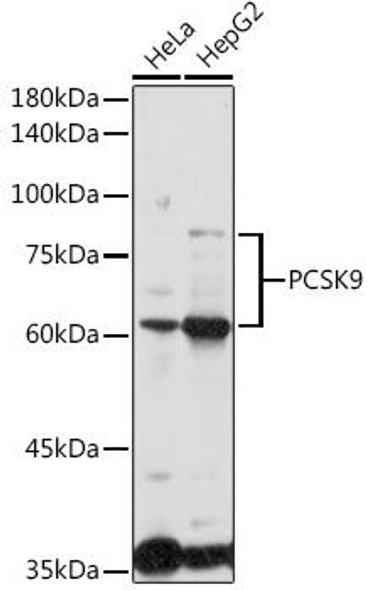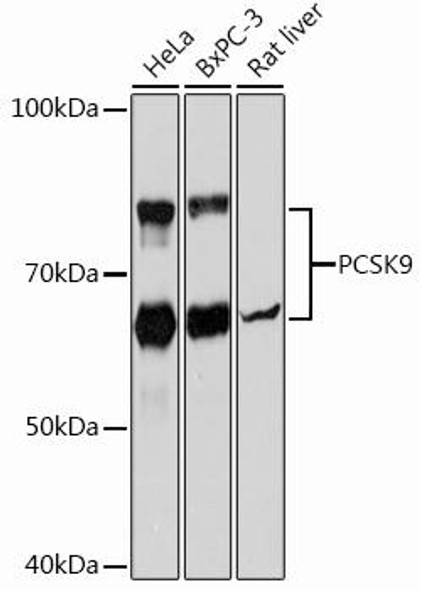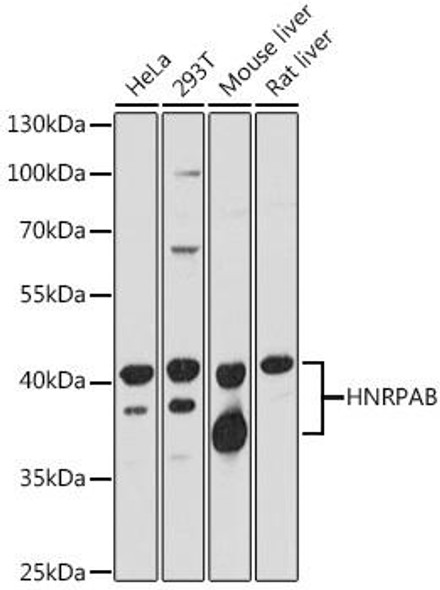Description
PCSK9 Polyclonal Antibody (CAB24478)
The PCSK9 Polyclonal Antibody (CAB24478) is a valuable tool for researchers studying the PCSK9 protein, which plays a crucial role in regulating cholesterol levels in the blood. This antibody, produced in rabbits, shows high reactivity with human samples and has been validated for use in Western blotting applications.PCSK9 is a key player in the regulation of LDL receptor levels, ultimately impacting the amount of LDL cholesterol that is cleared from the bloodstream. Dysregulation of PCSK9 has been linked to hypercholesterolemia and an increased risk of cardiovascular disease. By targeting PCSK9, researchers have the potential to develop therapies aimed at lowering cholesterol levels and reducing the risk of heart disease.
The PCSK9 Polyclonal Antibody enables precise detection and analysis of the PCSK9 protein in various cell types, making it an essential tool for studies in the fields of lipid metabolism, cardiovascular disease, and drug development. Understanding the mechanisms by which PCSK9 impacts cholesterol homeostasis is crucial for the development of new therapeutic strategies aimed at combating heart disease and improving patient outcomes.
| Product Name: | PCSK9 Polyclonal Antibody |
| Product Code: | CAB24478 |
| Reactivity: | Human, Rat |
| Applications: | Western blotting, Immunofluorescence, Immunoprecipitation |
| Host Species: | Rabbit |
| Purification Method: | Affinity purification |
| Isotype: | IgG |
| Reactivity: | Human, Rat |
| Tested Applications: | WB, IF/ICC, IP, ELISA |
| Key Applications: | Western blotting, Immunofluorescence, Immunoprecipitation |
| Recommended Dilution: | WB 1:100-1:500, IF/ICC 1:50-1:200, IP 1:50-1:200 |
| Storage Buffer: | Store at -20°C. Avoid freeze / thaw cycles.Buffer: PBS with 0.05% proclin300, 50% glycerol, pH7.3. |
| Positive Samples: | Hep G2, HeLa |
| Cellular Location: | Cell surface, Cytoplasm, Endoplasmic reticulum, Endosome, Golgi apparatus, Lysosome, Secreted |
This gene encodes a member of the subtilisin-like proprotein convertase family, which includes proteases that process protein and peptide precursors trafficking through regulated or constitutive branches of the secretory pathway. The encoded protein undergoes an autocatalytic processing event with its prosegment in the ER and is constitutively secreted as an inactive protease into the extracellular matrix and trans-Golgi network. It is expressed in liver, intestine and kidney tissues and escorts specific receptors for lysosomal degradation. It plays a role in cholesterol and fatty acid metabolism. Mutations in this gene have been associated with autosomal dominant familial hypercholesterolemia. Alternative splicing results in multiple transcript variants.
| Immunogen: | Recombinant fusion protein containing a sequence corresponding to amino acids 31-692 of human PCSK9 (NP_777596.2). |
| Sequence: | QEDED GDYEE LVLAL RSEED GLAEA PEHGT TATFH RCAKD PWRLP GTYVV VLKEE THLSQ SERTA RRLQA QAARR GYLTK ILHVF HGLLP GFLVK MSGDL LELAL KLPHV DYIEE DSSVF AQSIP WNLER ITPPR YRADE YQPPD GGSLV EVYLL DTSIQ SDHRE IEGRV MVTDF ENVPE EDGTR FHRQA SKCDS HGTHL AGVVS GRDAG VAKGA SMRSL RVLNC QGKGT VSGTL IGLEF IRKSQ LVQPV GPLVV LLPLA GGYSR VLNAA CQRLA RAGVV LVTAA GNFRD DACLY SPASA PEVIT VGATN AQDQP VTLGT LGTNF GRCVD LFAPG EDIIG ASSDC STCFV SQSGT SQAAA HVAGI AAMML SAEPE LTLAE LRQRL IHFSA KDVIN EAWFP EDQRV LTPNL VAALP PSTHG AGWQL FCRTV WSAHS GPTRM ATAVA RCAPD EELLS CSSFS RSGKR RGERM EAQGG KLVCR AHNAF GGEGV YAIAR CCLLP QANCS VHTAP PAEAS MGTRV HCHQQ GHVLT GCSSH WEVED LGTHK PPVLR PRGQP NQCVG HREAS IHASC CHAPG LECKV KEHGI PAPQE QVTVA CEEGW TLTGC SALPG TSHVL GAYAV DNTCV VRSRD VSTTG STSEG AVTAV AICCR SRHLA QASQE LQ |
| Synonyms: | PCSK9, FH3, HCHOLA3, LDLCQ1, NARC-1, NARC1, PC9, proprotein convertase subtilisin/kexin type 9 |
| Calculated MW: | 20kDa/74kDa |
| Observed MW: | 65kDa/80kDa |







